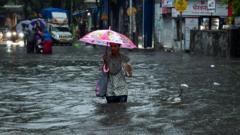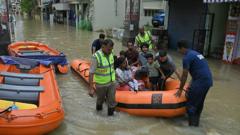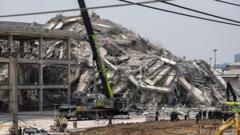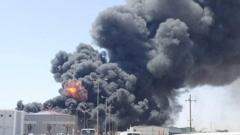A recent earthquake near Myanmar caused significant destruction in Bangkok, most notably the collapse of one high-rise building. Early investigations suggest that poor materials and unethical practices by a Chinese contractor may have contributed to this disaster, prompting calls for stricter construction regulations.
Structural Failures and Safety Concerns Following Bangkok Earthquake

Structural Failures and Safety Concerns Following Bangkok Earthquake
Investigations reveal construction flaws in Bangkok's only high-rise to collapse during the recent earthquake, raising alarm over safety standards used in the building industry.
Following the devastating earthquake that struck Myanmar and northern Thailand on Friday, all eyes turned to Bangkok where a single high-rise building notably collapsed. The tragedy resulted in at least 15 fatalities and numerous individuals still reported missing, highlighting the urgent need for effective recovery efforts. Initial analyses into the downfall of the structure point to troubling construction practices, specifically with the building’s design and the materials used.
Central to these inquiries is the China Railway 10th Engineering Group, a state-owned Chinese entity engaged in multiple projects throughout Thailand. As recovery operations unfold, it has been reported that some individuals connected to the company attempted to remove project documents from the site, raising suspicions about their accountability. The parent company, China Railway Group, is notorious for its significant financial obligations and ambitions for expansive infrastructure projects, despite facing widespread criticisms regarding safety standards across various international ventures.
Interviews with on-site workers reveal that the company routinely underpaid contractors, leading to the use of substandard construction materials. Reports from Thai officials indicate that twisted metal salvaged from the debris contained insufficient quality steel bars, merged at a factory in Thailand owned by Chinese interests which had faced shutdown orders earlier this year.
As investigations progress, experts anticipate it might take months to officially ascertain the reasons for this tragic incident, including compliance with safety regulations. This occurrence not only raises questions regarding construction safety practices in Thailand but also highlights the broader implications of cost-cutting measures that endanger lives.





















